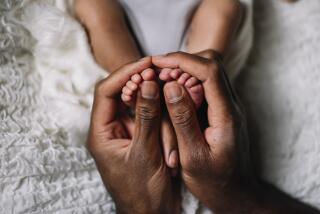Harried Grandparents Experience Parenting, the Second Time Around : Lifestyle: Researchers say drug and alcohol abuse, teen pregnancy, unemployment and AIDS are largely to blame. When parents are unable or unwilling to care for their children, their own parents often step in.
- Share via
WASHINGTON — Tom and Mary Fron had dreamed about life after the last of their four teen-agers moved out: They would buy a cabin in the northern Michigan woods and spend weekends snowmobiling. Just the two of them.
Then 16-year-old Betsy, their youngest, announced she was pregnant, and the Frons soon found they were not grandparents, but Mom and Dad. Again.
They adopted Nathan, now 5, when their unmarried daughter proved too immature to care for him and moved out. The Frons shuffled their work schedules to avoid day-care costs. The money they had saved for a vacation cabin pays for Nathan’s preschool.
“I wouldn’t give him up for anything,” Mary Fron said from her home in Niles, Mich. “But there are wild days when he’s playing his flute and has his dog romping with him in the house, and there is a smidgen of resentment that this isn’t what I expected.”
So much for baking cookies, reading stories and baby-sitting occasionally. Nowadays, being a grandparent can turn into a 24-hour-a-day job.
Researchers say drug and alcohol abuse, teen pregnancy, unemployment and AIDS are largely to blame. When parents are unable or unwilling to care for their children, grandparents often step in.
In 1992, almost 3.3 million children lived in a home maintained by a grandparent, according to the U.S. Census Bureau. Of those, 867,000 children--or about 1.3% of the nation’s youth--lived with grandparents in homes where neither parent was present.
Black and Hispanic children, especially those living in cities struggling with crack cocaine and AIDS, are more likely to live in a home maintained by a grandparent. The Census Bureau found 12% of black children living in a grandparent’s home, compared to 6% of Hispanic children and less than 4% of white children.
Nevertheless, about 60% of grandparents rearing grandchildren are white, and many are affluent, said Meredith Minkler, professor of public health at the University of California at Berkeley.
“Grandparent care cuts across class and ethnic group lines,” Minkler said.
Child-rearing grandparents range in age from the late 20s to early 90s, Minkler said. Some grandparents are surprisingly young because they became parents as teen-agers, and so did their children.
Tom and Mary Fron, 47 and 46 respectively, are among the young grandparents.
But most of the grandparents rearing children again are beyond the typical child-rearing age. Preliminary studies at Berkeley show more than half are 55 or older, and one-quarter are 65 or older.
For the older ones, especially, serving as parents again “can really take a toll,” Minkler said.
There is good news, however. As awareness of the problem grows, more help and advice are available for these grandparents.
Mary Fron helped establish a network of support groups called ROCKING, or Raising Our Children’s Kids: an Intergenerational Network of Grandparenting. It receives hundreds of calls and letters a week.
Last September, the American Assn. of Retired Persons opened a Grandparent Information Center to help second-time-around parents cope with financial, legal and emotional problems.
“In our first five months, we had over 2,400 calls or letters requesting help,” said coordinator Renee Woodworth.
The AARP center offers tips ranging from how to find a baby-sitter to the advantages of adopting a grandchild. It also refers callers to more than 350 local support groups.
The center is asked most often about legal issues, such as whether a grandparent should seek court-ordered custody or go through a foster parent program, Woodworth said.
Many grandparents also need help with finances. Retirees may find their pensions and Social Security won’t pay the new bills. Their health insurance often doesn’t extend to grandchildren. They may be forced to move out of subsidized senior-citizen housing that doesn’t allow children.
“Sometimes it will mean not taking their medicine to buy their kids a pair of jeans,” Mary Fron said.
Then there are the emotional stresses: Older care givers may feel isolated from friends their own age. But they don’t feel comfortable among the young families at parent-teacher association meetings, either.
Some resent the loss of the traditional grandparent role. Some are racked by guilt because their children did not turn out to be good parents.
There is often self-doubt, and one overriding fear--that their health will fail.
Jessie and Morton Taylor of Duluth, Minn., 55 and 53 respectively, worry about who will care for their 7-year-old grandson, Patrick, if they don’t live long enough.
“What we worry about is seeing him through high school, getting him raised, and keeping our health until then,” said Jessie Taylor.
The Taylors fought their youngest son and his wife for legal custody of Patrick when they saw signs of neglect. He was 2 1/2 at the time.
“It was horrendous. It was awful,” she said. “You pray the whole time that you’re doing the right thing, and then you pray you can handle it all, to raise a child again.”
More to Read
Sign up for Essential California
The most important California stories and recommendations in your inbox every morning.
You may occasionally receive promotional content from the Los Angeles Times.













